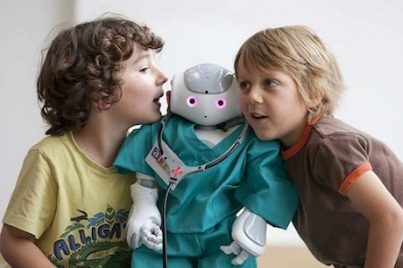“As infants, we see the world in parts. There is the good—the things that feed and nourish us. There is the bad—the things that frustrate or deny us. As children mature, they come to see the world in more complex ways, realizing, for example, that beyond black and white, there are shades of gray. The same mother who feeds us may sometimes have no milk. Over time, we transform a collection of parts into a comprehension of wholes.With this integration, we learn to tolerate disappointment and ambiguity. And we learn that to sustain realistic relationships, one must accept others in their complexity. When we imagine a robot as a true companion, there is no need to do any of this work.”
― Sherry Turkle, Alone Together: Why We Expect More from Technology and Less from Each Other
With the rapid evolution of technology, we’re having a relatively easy time adapting to the change. If you asked someone 10 years ago,”Do you believe technology will end up impacting our future?” the answer would have been a certain and definitive “no”. However, we’re now finding it easier and easier to adapt to the ever evolving technology. From our smartphones to robots, we are willing to seek comfort from them, as opposed to reaching out to our loved ones. We’d rather spend our days locked in a room with our phones, than interact with our family and friends.
When I was younger, I had a small laptop that played nursery rhymes on a loop. I would carry it around everywhere, and anytime my mother would scold me I would choose to listen to those rhymes and ignore her. What we’re witnessing now is similar, but perhaps it occurs on a greater scale.

Image Getty: “Excessive Screen Time on Phones and Tablets Are ‘Digital Heroin’ for Young Kids.” Mirror, 3 Sept. 2016, http://www.mirror.co.uk/news/world-news/excessive-screen-time-phones-tablets-8755843.
Children are more willing to seek comfort in their phones and tablets than in humans. We witness it in our day to day life. Nephews and nieces greeting you with a half -hearted kiss to the cheek and then running back to their tablets so they can keep playing their colorful and obnoxiously loud games, children throwing tantrums in supermarkets when their parents grab their phone from their hands , only to give it back when they realize the struggle is to no avail. Children are more dependent on their seemingly simple technological world than on the actual complex human world.
It’s not only the tiny rectangular screens that are robbing children from human affection, it’s the animatronic dolls that are constantly being dragged around by them. Dolls that are capable of repeating a certain number of phrases, yet they’re able to give children the affection needed. What causes such thing, what leads children to seek comfort in phones and monotonous dolls as opposed to their parents and friends? A simple reason mentioned by Sherry Turkle is “As children mature, they come to see the world in more complex ways, realizing, for example, that beyond black and white, there are shades of gray”.(Turkle) Children are incapable of understanding the blurred lines of realities, what is bad and what is good, who is kind and who is evil . They find it hard to find answers to such complex questions. They’d rather find comfort in something straight forward and easily understood. A clear black and white as opposed to a confusing grey.

Tim Hornyak Posted 2 Sep 2010 | 2:31 GMT. “Robot Companions to Befriend Sick Kids at European Hospital.” IEEE Spectrum: Technology, Engineering, and Science News, 1 Sept. 2010, spectrum.ieee.org/automaton/robotics/artificial-intelligence/robot-companions-to-befriend-sick-kids-at-european-hospital.
Recently, a “companion” dog was invented to bring companionship and comfort to it’s owners. When children were monitored while interacting with the robot, they responded as if it were a real dog ; that in itself is very concerning.(Howard) Children are not able to identify what is real from what is fake from the constant exposure to technology they endure. It’s one thing to trust their furbies and smart phones, but a robot imitating a living soul is horrifying. The reason is once again as mentioning by Turkle in her book Alone Together:Why We Expect More From Technology and Less from Each Other, kids find it easier to understand things in black and white. They don’t like to understand disappointment, they don’t like to understand that their dog may be tired to sick so he wont be able to play today. They like having something constantly uplifting, a robot that you charge overnight so you can spend the entire day playing along with it.
Technology is only evolving from here. There is no controlling where it escalates, but we must control how it impacts us and our children. We need to control their understanding of reality, and help them understand the specter of color. The world is not just black and white, it’s a colorful spectacle that we need to understand. It is vital that we understand how our children feel and think, so we can help protect them from the digital monstrosity.
Work Citied
Howard, Jacqueline. “Can Robot Pets Comfort like the Real Thing?” CNN, Cable News Network, 1 Nov. 2017, edition.cnn.com/2016/10/03/health/robot-pets-loneliness/index.html.
Behr, Rafael. “Alone Together: Why We Expect More from Technology and Less from Each Other by Sherry Turkle – Review.” The Observer, Guardian News and Media, 29 Jan. 2011, http://www.theguardian.com/books/2011/jan/30/alone-together-sherry-turkle-review.
Turkle, Sherry. “Connected, but Alone?” Sherry Turkle: Connected, but Alone? | TED Talk, http://www.ted.com/talks/sherry_turkle_alone_together.
Featured Image :BC3. “EOCBC3.” Why Parents Should Educate Their Kids about Technology? , 1 Jan. 2006, eocbc3.blogspot.com.eg/2012/07/why-parents-should-educate-their-kids.html.
Hi Rima,
Great post!
I agree with you that we have to control technology use for children because if adults still need control, then children are easier targets to be addicted to technology. Even if technology gives children certain digital skills, parents should manage the time spent and the websites used by their children, because I see kids nowadays saying and doing things I wouldn’t in a million years say or do!
LikeLiked by 1 person
That is true, the exposure of media turns children toxic. We can only hope to control it.
LikeLiked by 1 person
Very good reflection of the quote, Rima! You made some very good points about our childhood with technology and how even though we’re older, our behavior towards technology remains the same. Well done!
LikeLiked by 1 person
Im glad you enjoyed it salma 🙂
LikeLike
You made a great point towards the end. We can’t necessarily stop technology from being in our day to day lives but we can indeed control the intensity of its impact.
LikeLiked by 1 person